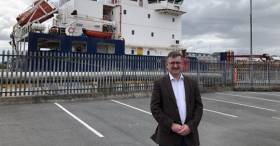Displaying items by tag: Service Restored
Ferries from Galway City to the Aran Islands will after a lenghtly absence make their return to Galway Docks – with the announcement that Island Ferries will begin operating the service from next year.
According to the Connacht Tribune from May 2020, a vessel that is currently under construction in the Far East will become the largest domestic ferry on the Irish Coast and “will bring a new experience for passengers, never seen on Galway Bay before”.
That’s according to CEO of the Port of Galway, Conor O’Dowd, who said the new ferry was just one of a raft of exciting developments for the port – including the delivery of a new crane allowing for increased business and long-awaited progress on plans to extend the port.
For more on this ferry service development click here.
Afloat.ie adds that existing passenger services are operated west of Galway City from Rossaveal in Connemara in addition to those based out of Doolin in Co. Clare.
The last State run operated Galway-Aran ferry service ended in the summer of 1988 when Córas Iompair Éireann (CIÉ) used the custom Dublin-built Naomh Éanna completed at the Liffey Dockyard in 1958 to provide the joint passenger and freight service. As previously reported the veteran vessel is undergoing restoration to serve as a floating luxury hotel on the Liffey.
Another custom built ferry Oileáin Árann built in 1992 but privately operated by Doolin based O'Brien Shipping served the direct city-islands route. Notably, this was the final ship to provide this link until sold to Samskip an Icelandic based company.
A cargo-only service currently maintains sailings between Galway and all three Aran Islands. This is operated by Lasta Mara Teoranta's cargoship Bláth na Mara.
























































